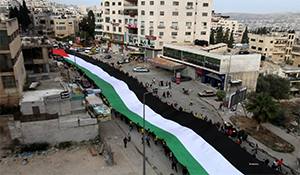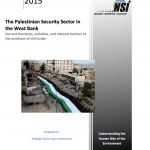Barriers to Civil Order in Palestinian Security Sector

The Palestinian Security Sector in the West Bank: Current Functions, Actvities, and Internal Barriers to the Provision of Civil Order.
Author | Editor: Desjardins, A., Polansky (Pagano), S., Popp, R. & Rieger, T. (NSI, Inc).
The origins of the Palestinian security sector can be traced to the 1993 Oslo I Accord, which established divisive security and policing responsibilities between the Palestinians and Israelis and the Oslo II agreement, which codified interim boundaries, including the division of the West Bank into a complex and fragmented patchwork of different jurisdictions. These divisions of land and security responsibilities remain in place to this day and have fostered a unique, complicated, and at times perplexing situation for both the Palestinian security sector and the civil society it serves to protect. The environment in the West Bank is replete with confusion over security sector authorities and responsibilities, frustration over barriers1 to the provision of security and justice, and fear and mistrust of the security sector forces. Moreover, the absence of publically available mission statements and codified legal documents, that clearly delineate the Palestinian security sector roles and responsibilities, adds to the complex situation.
At the request of the United States Security Coordinator (USSC) staff, an analysis was conducted to identify security sector reform measures that would assist in fostering a healthy and transparent relationship between the Palestinian security sector and Palestinian civil society in the West Bank. To this end, we focused on assessing the performance of the Palestinian security sector in the provision of security to the Palestinian civil society via a two stage analytic methodology. First, we conducted a qualitative assessment comparing Palestinian security sector functions and activities that are authorized based on legal documents with those that are reported via news reports and by civil society, and, second, we compared this with acceptable practices in the provision of security consistent with modern security forces. To simplify and clearly convey our analysis, we utilized “living” Venn diagrams, which allows for the rapid integration of additional data and information as they become available. This was followed by a barrier analysis identifying internal and external barriers and their associated root causes in the provision of security that is not in alignment with Palestinian civil society perspectives and expectations. The identification and classification of barriers and their root causes facilitates the detection of points for security sector reform measures that can both strengthen and solidify the Palestinian security sector in a manner that is popularly accepted and sustainable with the Palestinian civil society.
Overall, our analysis identified five primary barrier categories in the provision of security by the Palestinian security sector—fear based barriers, clarity and alignment barriers, population engagement barriers, capability barriers, and legal barriers. Several external barriers, which are based on factors or influence outside of Palestinian control, were identified (e.g., culture of fear and limitations on movement or other activities). These factors are more difficult to overcome in the current environment in the West Bank and, in many cases, may be rooted in an intractable problem. However, several internal barriers, such as insufficient legal frameworks or lack of preparedness, that are within the control of the Palestinian security sector were identified. This suggests that mitigating actions can be taken by the Palestinian security sector in partnership with international partners, even given the currently limiting socio3political environment in the West Bank, to reduce or dampen their effect on the provision of security.
Thus, drawing from our analysis, several high3level security sector reform measures and mitigation strategies emerged. Our analysis suggests several focus areas for security sector reforms and development. Each is critical to the provision of security in the Palestinian Authority, is consistent with acceptable practices of modern security forces, and should facilitate civil society involvement.
Clarify confusion over roles and responsibilities—support the creation of clear, comprehensive, and codified legal documents laying out the missions and duties of each Palestinian security sector entity; this helps ensure accountability of and trust in the Palestinian security sector and its ability to ensure the safety of its citizens.
- Guide Palestinian security sector toward completion of comprehensive legal documents that delineate Palestinian security sector forces mission and duties in clear language;
- Ensure that guidelines establish the lines of authority and purview within and across the forces;
- Emphasize common Palestinian identity and goals as part of a superordinate ingroup, but avoid the pitfall of reinforcing Israel as the outgroup;
- Work to establish a more cohesive security philosophy that can guide all of the Palestinian security sector forces in pursuit of a common goal.
Strengthen legitimacy—take measures to re3establish the trust of Palestinian civil society in its security sector forces in order to promote cooperation and adherence, as well as smooth the path for the Palestinian security sector to perform its duties once they are more clearly and explicitly defined and established.
- Guide Palestinian security sector toward establishing formal complaint and feedback systems, which will not result in retribution;
- Establish protocols and training that facilitate respectful and fair treatment of members of Palestinian civil society and avoid human rights abuses;
- Emphasize the proper selection of candidates for jobs at the individual and aggregate level
- Work to reduce cronyism and other forms of bias in employment selection;
- Encourage organizations to take responsibility for missteps and apologize to the population as needed when mistakes are made;
- Work to establish an effective witness protection program;
- Work to more generally increase transparency and accountability;
- Work to establish independent oversight, for example, through the appointment of an ombudsman to investigate citizens’ complaints.
Improve equipping and training of forces—critical for Palestinian security sector to effectively execute its duties is having sufficient equipment and training, although this issue may be less easily resolved due to dependence of the Palestinian Authority for Israeli approval of materiel.
- Prioritize the establishment and funding of an improved communications infrastructure for security;
- Work to centralize training facilities;
- Streamline training curricula to emphasize common principles and needs across security organizations, while maintaining differentiation as needed;
- Perform an audit of existing training;
- Assess remaining training needs based on pain points after the higher priority goals have been met and/or barriers have been mitigated;
- Ensure that training maps to the overarching security philosophy that should be established in advance.

Comments